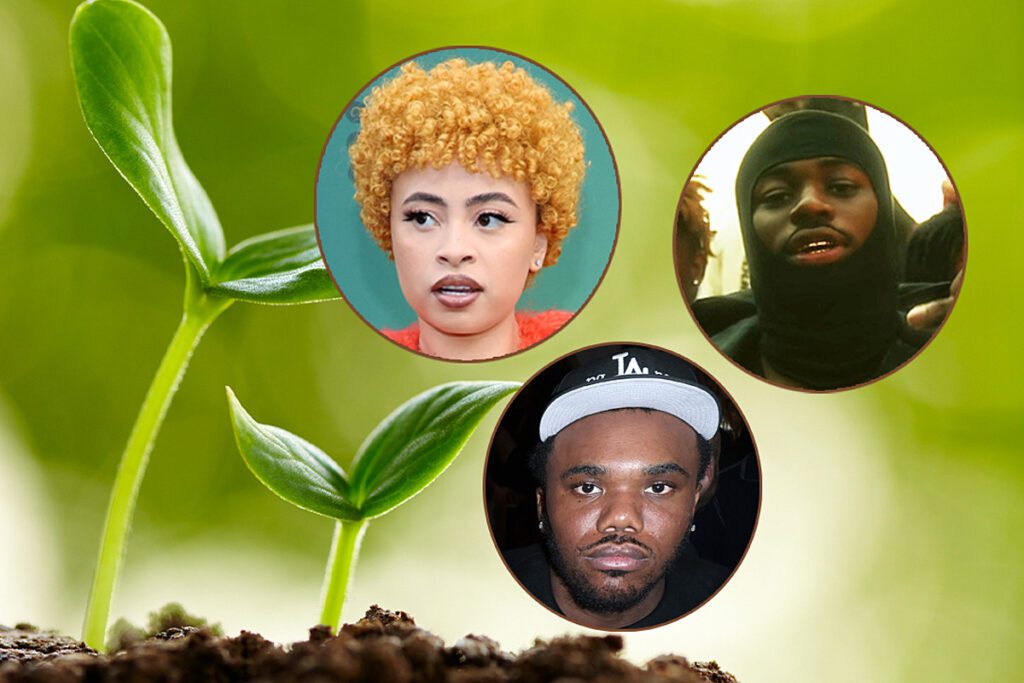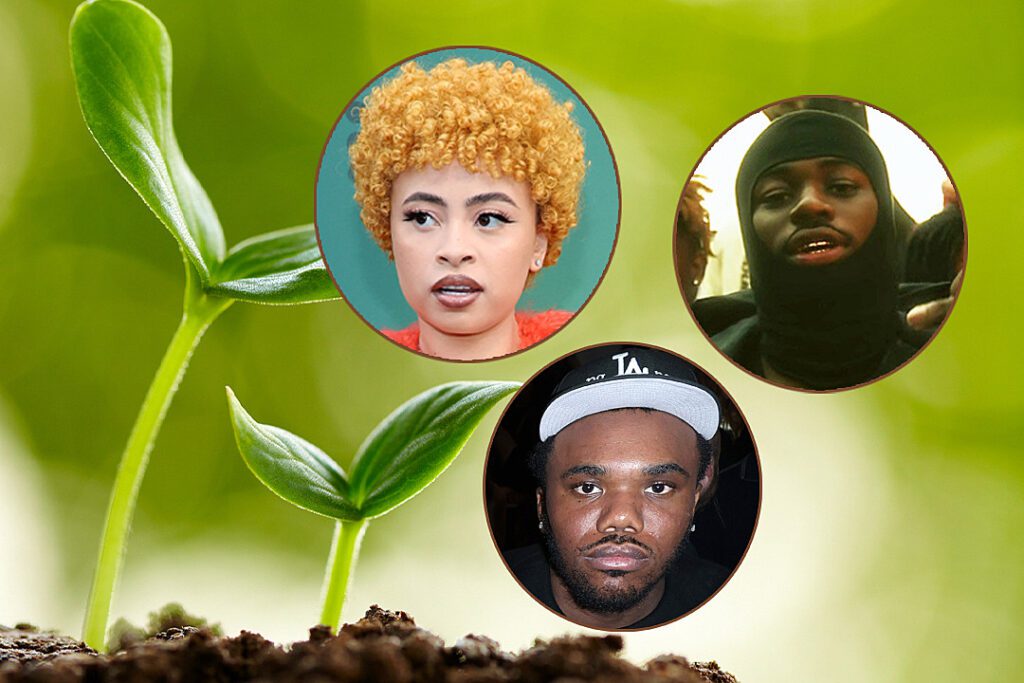
In hip-hop, the term “industry plant” is thrown around by fans more frequently than ever. When a new rapper begins to rapidly blow up within the space, they are often accused of having been strategically positioned into the mainstream by music business insiders. The most recent examples being labeled with no proof are artists like Ice Spice and 4Batz. In most cases, detractors let those accusations fly without any concrete proof. In fact, it can be argued that one is hard-pressed to find what exactly defines an industry plant or if such a thing exists at all.
Typically, an industry plant is a negative term used to describe artists who become popular through their connections in the music industry rather than on their own merits, whether that be nepotism, wealth or inheritance.
There’s no doubt that being referred to as an industry plant carries a negative connotation for any artist. However, when put into perspective, it almost seems counterintuitive to scrutinize a creative in any way regardless of whether or not nepotism, media training or being discovered by a proven professional has anything to do with their success. Talent is talent, is it not?
Who Are Hip-Hop’s First Industry Plants?
The rap game’s first instance of what many perceive to be the definition of an industry plant can be traced back to the late 1970s with the origin story of The Sugarhill Gang. When the founders of Sugar Hill Records, Sylvia and Joseph Robinson, came up with the concept for “Rapper’s Delight” in 1979, the husband and wife duo hand-picked Wonder Mike, Big Bank Hank and Master Gee to form the group and had them recite the song’s previously written lyrics.
The result was hip-hop’s first commercially successful record. Even though the authenticity of The Sugarhill Gang remains in question, how else would rap music and what it represents have grown beyond New York City’s five boroughs into the global phenomenon it is today without their contribution? So, it can be argued they’re not industry plants at all.
The Term “Industry Plant” Comes to Prominence in the 2010s
As hip-hop progressed through the years, the word industry plant wasn’t being thrown around to describe rappers until the 2010s. The term got more popular when the blossoming careers of rhymers such as Chance The Rapper and Travis $cott took off. Then the “industry plant” label became part of hip-hop’s common vernacular in the internet age. Despite both artists being considered creative masterminds in their respective ways, many naysayers believed, at the time, that their come ups were forced upon the culture rather than finding success on their own merit. They are plenty of conversations online that date back to articles and message boards that discuss the industry plant claims.
Cardi B is another example of a rising star whose legitimacy was brought into question during her rise to the top of not only hip-hop but pop culture as a whole in the late 2010s. Following her days as a popular exotic dancer in New York City and a run on VH1’s Love & Hip Hop, Bardi decided to lean into her increasingly growing social media following by pursuing a career in rap music. In 2017, Cardi B reached No. 1 on the Billboard Hot 100 with “Bodak Yellow,” which was met with claims that Atlantic Records actually paid for the Bronx rhymer’s success. In response, Cardi hit up social media to dispute the industry plant accusations.
“I’m thankful for Bodak yellow cause it had people and even the label believe in me,” Cardi B wrote in a 2018 Instagram post. “YOU CANT NOT BUY THE GENERAL PUBLIC NO
MACHINE NO MONEY CAN’T BUY THAT! Having stadiums sing out your s**t YOU CANT BUY THAT!”
She continued: “Having artist listening to your music and supporting you can’t buy that! A NUMBER ONE YOU CANT BUY THAT! If it was that easy why can’t they buy everybody on the label one? YOU CANT BUY THE PEOPLE.”
Is the Music Industry a Game of Who You Know?
Whether or not major record labels can use influence and finances to sway mainstream audiences remains a heavy debate. Many hip-hop fans have accused artists of finding their way into the spotlight through those within the industry they are related to. In 2020, Staten Island, N.Y. native CJ landed a top 10 spot on the Billboard Hot 100 “Whoopty,” the most commercially successful New York drill song that wasn’t released by the late Pop Smoke. During that time, CJ was the subject of rampant industry plant rumors given the fact that his uncle is longtime record executive James Cruz.
Similarly, Baby Keem‘s position in hip-hop has been widely ridiculed simply for being the cousin of A-list MC Kendrick Lamar. Even if nepotism did play some sort of role in the careers of artists such as CJ and Baby Keem, it hardly seems fair to diminish their creative output based on the families they were born into.
Artists Who’ve Embraced Being Called an Industry Plant
Some artists have embraced being called an industry plant regardless of the negative undertones the label carries. Georgia-bred rapper Raury made a tremendous splash with his 2014 hit “God’s Whisper” and was immediately lambasted for what was deemed as inorganic success. Rather than deny the jeers, he boldly sported an “Industry Plant” T-shirt on the cover of XXL Magazine as a member of the 2015 Freshman Class. After his rapid ascent in 2019, Iann Dior coyly titled his debut album Industry Plant as an apparent nod to the internet’s keyboard warriors.
Rising Rappers Are Being Accused of Being Industry Plants More Than Ever
In 2024, industry plant accusations have all but ramped up. Platforms like Reddit have found rappers like Ice Spice being referred to as “the biggest industry plant of our lifetime,” all due to a meteoric rise that includes chart-topping songs and brand deals in a relatively short time.
Most recently, some hip-hop fans have had an incredibly difficult time embracing Dallas rap newcomer 4Batz as anything short of an artist being planted into the spotlight. Primarily off the strength of his viral track “Act II: Date @ 8,” which has amassed a staggering 85 million Spotify streams since its release in December of 2023, the rap crooner’s come up has become a daily conversation in the hip-hop space. He’s only dropped through songs so far and a remix with Drake, but 4Batz’s minimal output and current success doesn’t make him an industry plant.
With only four songs to date, the bit of mystery behind 4Batz has seen a social media following that increases by the thousands with each passing day. Along with major cosigns from the rap game’s top acts such as Drake and Kanye West, 4Batz is just the latest in a seemingly never-ending barrage of industry plant accusations without any concrete evidence. Videos of 4Batz went viral early last year for the simple fact that he’s catching attention by wearing a ski mask and beater while singing his heart out. Attention shouldn’t equal accusations.
In all, as the music industry continues to evolve in the ever-changing way fans consume music, the existence of so-called industry plants continues to dominate the conversation. Is the record business purposefully injecting artists into the game in hopes of people gravitating toward their catchy music and magnetic personalities? Or is it nothing more than a conspiracy theory designed by those who live by hitting up the social media comments sections? That’s for you to decide.

